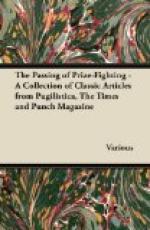* * * * *
SAYINGS & DOINGS IN THE ROYAL NURSERY.
We are enabled to assure our readers that his Royal Highness the Duke of Cornwall has appointed Lord Glengall pap-spoon in waiting to his Royal Highness.
The Lord Mayor, Lord Londonderry, Sir Peter Laurie, Sir John Key, Colonel Sibthorp, Mr. Goulburn, Peter Borthwick, Lord Ashburton, and Sir E.L. Bulwer, were admitted to an interview with his Royal Highness, who received them in “full cry,” and was graciously pleased to confer on our Sir Peter extraordinary proofs of his royal condescension. The distinguished party afterwards had the honour of partaking of caudle with the nursery-maids.
Sir John Scott Lillie has informed us confidentially, that he is not the individual of that name who has been appointed monthly nurse in the Palace. Sir John feels that his qualifications ought to have entitled him to a preference.
The captain of the Britannia states that he fell in with two large whales between Dover and Boulogne on last Monday. There is every reason to believe they were coming up the Thames to offer their congratulations to the future Prince of Whales.
* * * * *
THE REWARD OF VIRTUE.
We understand that Sir Peter Laurie has been presented with the Freedom of the Barber’s Company, enclosed in a pewter shaving-box of the value of fourpence-halfpenny. On the lid is a medallion of
[Illustration: THE HARE A PARENT.]
* * * * *
A difficulty, it is thought, may arise in bestowing the customary honour upon the chief magistrate of the city, upon the birth of a male heir to the throne, in consequence of the Prince being born on the day on which the late Mayor went out and the present one came into office. Sir Peter Laurie suggests that a petition be presented to the Queen, praying that her Majesty may (in order to avoid a recurrence of such an awkward dilemma) be pleased in future to
[Illustration: MIND HER DATES.]
* * * * *
PUNCH’S THEATRE.
COURT AND CITY.
The other evening, the public were put in possession, at Covent Garden Theatre, of a new branch of art in play concoction, which may be called “dramatic distillation.” By this process the essence of two or more old comedies is extracted; their characters and plots amalgamated; and the whole “rectified” by the careful expunction of equivocal passages. Finally, the drame is offered to the public in active potions; five of which are a dose.
The forgotten plays put into the still on this occasion were “The Discovery,” by Mrs. Frances Sheridan, and “The Tender Husband,” by Sir Richard Steele. From one, that portion which relates to the “City,” is taken; the “Court” end of the piece belonging to the other. In fact, even in their modern dress, they are two distinct dramas, only both are played at once—a wholesome economy being thus exercised over time, actors, scenery, and decorations: the only profusion required is in the article of patience, of which the audience must be very liberal.




